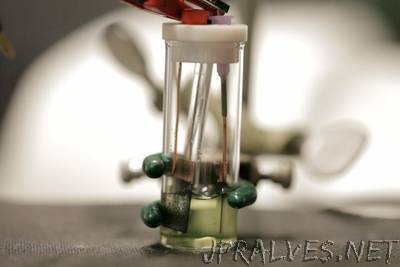
“When it comes to removing very dilute concentrations of pollutants from water, existing separation methods tend to be energy- and chemical-intensive. Now, a new method developed at MIT could provide a selective alternative for removing even extremely low levels of unwanted compounds. The new approach is described in the journal Energy and Environmental Science, in a paper by MIT postdoc Xiao Su, Ralph Landau Professor of Chemical Engineering T. Alan Hatton, and five others at MIT and at the Technical University of Darmstadt in Germany. The system uses a novel method, relying on an electrochemical process to selectively remove organic contaminants such as pesticides, chemical waste products, and pharmaceuticals, even when these are present in small yet dangerous concentrations. The approach also addresses key limitations of conventional electrochemical separation methods, such as acidity fluctuations and losses in performance that can happen as a result of competing surface reactions.”
